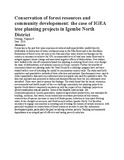| dc.description.abstract | Kenya has in the past few years experienced reduced and unpredictable rainfall directly attributable to destruction of water catchment areas in the Mau forest and in the Aberdares Restoration of forest cover not only in the Mau and other water towers but through out the country is necessary to achieve the 10% recommended level of total area under forest and to mitigate against climate change and associated negative effects of deforestation.
Few studies have looked at the role of community based tree planting in restoring forest cover even though the issue of deforestation is of national concern in Kenya currently. Further the benefits of community based tree planting under the Total Kenya Eco challenge program have not been studied with a view of extending the model to communities country wide. The study used both qualitative and quantitative methods of data collection and analysis. Questionnaires were used to collect quantitative data and a key informant interview guide was used for qualitative data. The data was analysed and presented in tables and dominant themes from the key informants were identified. These were used to present the findings.
The study found that the social, economic, environmental and health impact of the eco challenge community tree planting projects on Igembe North district community members as well the impact of eco challenge projects on poverty eradication was all positive. Some of the benefits cited include: Job creation/employment, Income generation, improved agricultural productivity; raw materials for building, medicine, fuel wood, scenic beauty and recreation prevention of soil erosion, conservation of species, increase in variety of foods grown, reduction in time spent fetching water, fewer drought occurrences, and Food security within 1gembe North.
It is therefore necessary to engage communities in arresting and reversing the erosion of natural resources, with particular emphasis on conservation of forest resources in order to meet the millennium development goals, particularly the goal on halving extreme poverty. Tackling environmental degradation is an integral part of effective and lasting poverty reduction. | en_US |

